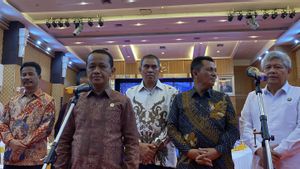JAKARTA - The Institute for Development of Economics and Finance (Indef) said that there are three negative impacts of banning social commerce.
This is related to the publication of Minister of Trade Regulation (Permendag) number 31 of 2023 concerning Business Licensing, Advertising, Development and Supervision of Business Actors in Trading Through Electronic Systems (PMSE).
First, banning social commerce can hinder innovation. Because, when one business model is banned, the next business model innovators will think twice about innovating and will also think twice about investing in Indonesia.
"So, actually, in my opinion, the ban on social commerce is a bad signal for innovators and business actors in Indonesia, because they have invested money, energy and thoughts to find this new business model, but then it is banned. This is of course a concern for business actors and other innovators to later find new business models," said Indef Economist Izzudin Al Farras Adha in a Public Discussion entitled 'Prohibition of Social Commerce Transactions, Is it Right?' virtually, Tuesday, October 3.
Farras believes that in the current era of the digital economy there will always be new business models, so people must be able to adapt to this.
"Including what we feel today in various sectors and sub-sectors of the digital economy, there is a lot that is new," he said.
Second, the impact of the ban on social commerce is that traditional or offline markets will no longer be visited by the public.
Because, people can still shop or make transactions via e-commerce, which is already common in Indonesia.
"So, the ban on social commerce does not automatically make people flock back to shopping at traditional or offline markets," he said.
The third or final impact is that the live shopping industry and live selling studio business will continue to grow.
"Even though there is a ban on social commerce, I see that live shopping will continue to grow, how can it develop? There are at least three things," said Farras.
اقرأ أيضا:
These three things include, studio design which can be rearranged in such a way as to suit the product category and brand identity of the product, then there are live streaming support facilities, for example the presence of smooth internet and Open Broadcaster Software (OBS) devices which can improve video quality, complete lighting sets, and various other filming equipment.
Then, integration or promotion of services between studios and e-commerce platforms will make it easier for companies to market their products on these platforms.
The English, Chinese, Japanese, Arabic, and French versions are automatically generated by the AI. So there may still be inaccuracies in translating, please always see Indonesian as our main language. (system supported by DigitalSiber.id)











